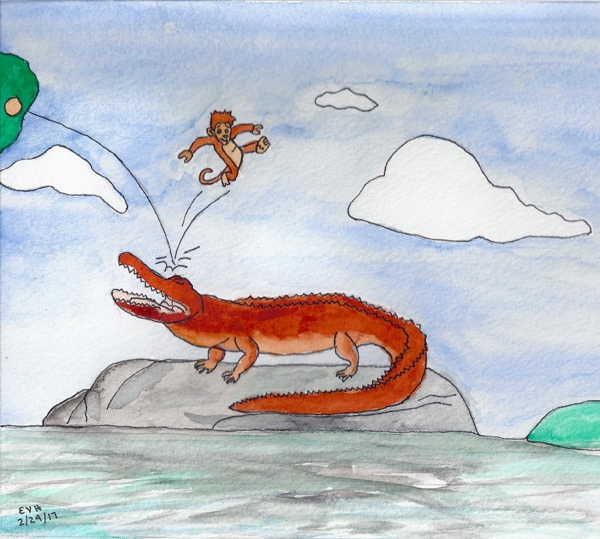
Jataka 57
Vānarinda Jātaka
The Monkey King
as told by Eric Van Horn
originally translated by Robert Chalmers, B.A., of Oriel College, Oxford University
originally edited by Professor Edward Byles Cowell, Cambridge University
This story is usually used as an example of wisdom, or “pañña” in Pāli. However, as I have noted elsewhere, “pañña” really means something more like “discernment,” as Ṭhānissaro Bhikkhu prefers to translate it. It is about the active quality of using your intelligence in the moment. It is about creative problem solving. In order to do this you need a clear mind and equanimity.
“Who are you, oh monkey king?” This story was told by the Master while he was at the bamboo grove. It is about Devadatta’s attempt to kill him. Being informed of Devadatta’s murderous intent, the Master said, “This is not the first time, monks, that Devadatta has tried to kill me. He also did this in bygone days, but he failed to work his wicked will.” And so saying, he told this story of the past.
Once upon a time when Brahmadatta was reigning in Benares, the Bodhisatta was born as a monkey. When he was fully grown, he was as big as a mare’s foal and enormously strong. He lived alone on the banks of a river. In the middle of the river there was an island where mangoes and bread-fruits and other fruit trees grew.
In the middle of the stream, half way between the island and the river bank, there was a solitary rock that rose out of the water. Being as strong as an elephant, the Bodhisatta used to leap from the bank on to this rock and then on to the island. Here he would eat his fill of the fruits that grew on the island, returning in the evening by the way he came. And such was his life from day to day.
Now in those days a crocodile and his mate lived in that river. She, being with young, and seeing the Bodhisatta journeying back and forth, longed for the monkey’s heart to eat. So she begged her lord to catch the monkey for her. Promising her that he would do this, the crocodile went off and crawled onto the rock, meaning to catch the monkey on his evening journey home.
After ranging about the island all day, the Bodhisatta looked out in the evening towards the rock and wondered why the rock stood so high out of the water. For the story goes that the Bodhisatta always marked the exact height of the water in the river and of the rock in the water. So when he saw that even though the water stood at the same level, the rock seemed to stand higher out of the water. He suspected that a crocodile might be lurking there to catch him. In order to find out if that was true, he shouted, as though addressing the rock, “Hi! Rock!” And, as no reply came back, he shouted three times, “Hi! Rock!” And as the rock still kept silence, the monkey called out, “Why is it, friend rock, that you won’t answer me today?”
“Oh!” thought the crocodile, “So the rock is in the habit of answering the monkey. I must answer for the rock today.”
Accordingly, he shouted, “Yes, monkey, what is it?”
“Who are you?” said the Bodhisatta.
“I’m a crocodile.”
“What are you sitting on that rock for?”
“To catch you and eat your heart.”
As there was no other way back, the only thing to be done was to outwit the crocodile. So the Bodhisatta cried out, “There’s no help for me then but to give myself up to you. Open your mouth and catch me when I jump.”
Now you must know that when crocodiles open their mouths, their eyes shut. (Note that while this is what the story says, this is not a biological fact.) So, when this crocodile unsuspiciously opened his mouth, his eyes shut. And there he waited with closed eyes and open jaws! Seeing this, the wily monkey jumped on to the crocodile’s head, and then, with a spring like lightning, leaped to the bank. When the cleverness of this feat dawned on the crocodile, he said, “Monkey, one who in this world possesses the four virtues overcomes his foes. And I think that you possess all four.” And, so saying, he repeated this stanza:
Who so, oh monkey king, like you, combines
Truth, foresight, fixed resolve, and fearlessness,
Shall see his routed foe turn and flee.

Figure: The Clever Monkey
And with this praise of the Bodhisatta, the crocodile went back to his own place.
The Master said, “This is not the first time then, monks, that Devadatta tried to kill me. He did the same thing in bygone days as well.” And, having ended his lesson, the Master showed the connection and identified the birth by saying, “Devadatta was the crocodile of those days, the brahmin girl Ciñcā was the crocodile’s wife, and I myself was the Monkey King.”
(The story of Ciñcā occurs in several places, including the Dhammapada-aṭṭhakathā [xiii. 9] and Jātaka 472. She falsely accused the Buddha of impregnating her.)
